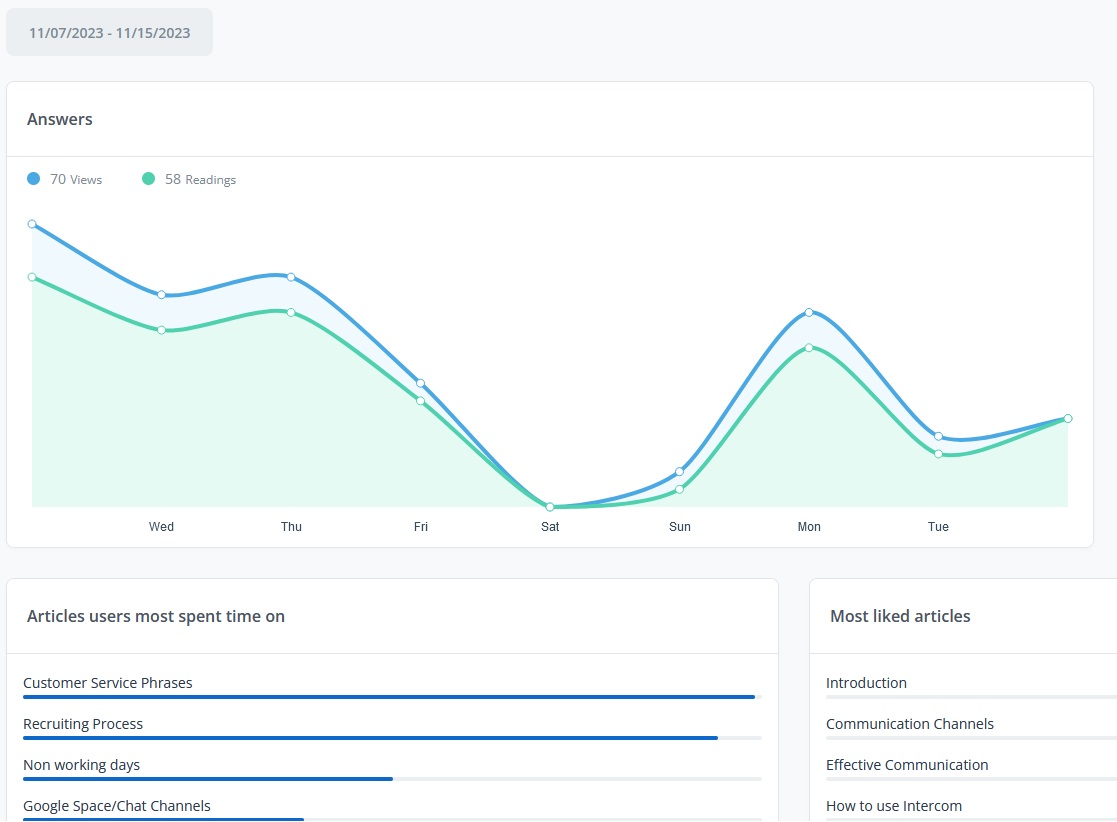Have you ever felt like you're sitting on a goldmine of information in your knowledge base, yet struggling to extract its true value? You're not alone. In today's world, where every click, query, and interaction holds untold insights, understanding your knowledge base is more than a strategic advantage—it's a necessity.
The answer to unlocking this treasure trove of data?
Knowledge base metrics.
Surprisingly, a Harvard Business Review study found that 57% of customer support calls come from those who first visited a company’s website, indicating many don't find the information they need online. Moreover, McKinsey reports that a robust knowledge management system can reduce the time spent searching for information by up to 35% and boost productivity by 20-25%.
Let's face it: Managing a knowledge base can often feel like navigating a complex maze, filled with critical questions: "Are we providing the right answers?", "How can we improve user experience?", and "What's the real impact of our content?" These questions aren't just theoretical; they're essential in a world where 70% of customers prefer using a company’s website for answers over phone or email, and 31% expect instant online help.
It's here that knowledge base metrics become invaluable. By having the right KPIs, you can gain actionable insights that directly address these questions. This isn't just about tracking data; it's about coming up with a knowledge base content strategy that addresses your customer's preferences and needs, and in turn, amplifies your organization's success.
Understanding the Importance of Knowledge Base Metrics
When you track the right metrics in your knowledge base, you're not just collecting data – you're unlocking the story of how your knowledge management impacts users and your organization. This is about seeing the big picture and the fine details of user interaction, content effectiveness, and how your knowledge base influences overall efficiency and satisfaction.
Seamlessly Integrating KCS Methodology for Enhanced Knowledge Base Management
Having explored the importance of knowledge base metrics, it's crucial to understand how methodologies like Knowledge-Centered Service (KCS) can revolutionize the management and utilization of these knowledge bases in customer support environments.
KCS is not just a strategy; it's a holistic approach that integrates the creation, improvement, and reuse of knowledge into daily customer support processes. This methodology transforms traditional support models, shifting from a centralized knowledge system to a dynamic, collaborative environment. By empowering support agents to contribute to and update the knowledge base, KCS fosters a culture of continuous learning and improvement. This approach ensures that the knowledge base remains current, relevant, and effectively tailored to solve customer issues quickly and accurately.
Implementing KCS in a contact center can lead to substantial improvements in several key metrics. Organizations have reported a 30-50% increase in first-contact resolution and a 70% faster time-to-proficiency for new analysts. Moreover, there's a noted enhancement in employee retention and satisfaction, alongside a reduction in the overall number of support requests or issues. Such changes underscore the methodology's impact not just on efficiency and customer satisfaction, but also on the morale and effectiveness of the support team.
The KCS methodology aligns perfectly with the pursuit of meaningful knowledge base metrics. It emphasizes quality and efficiency in customer interactions, focusing on real-time problem-solving and consistent customer experiences. Through KCS, contact centers can achieve a more nuanced understanding of how their knowledge base performs, influencing both the leading and lagging indicators of success.
With KCS, the story your knowledge base tells is not just about the data it holds, but about how effectively this data is harnessed to empower your support team and satisfy your customers. As we delve deeper into specific knowledge base metrics, keep in mind how methodologies like KCS can serve as a backbone for enhancing the overall effectiveness of your knowledge base management efforts.
Navigating Through the Key Knowledge Base Metrics
With the integration of KCS in mind, let's explore the essential metrics that provide comprehensive insights into the effectiveness of your knowledge base.
User Engagement Metrics
Delving into how users interact with your knowledge base gives you a window into its real-world impact.
A few metrics to look at include:
- Active Users: This metric is like a beacon showing the health of your knowledge base. By tracking the number of active users, you can gauge the overall appeal and relevance of your knowledge base. It's not just about counting heads; it's about understanding the reach and influence of your content. A rising trend in active users could indicate successful engagement strategies or the increasing value of your knowledge base.
- Session Duration: This metric tells you how long users stay engaged with your content. It's a subtle indicator of the value and usability of your knowledge base. Longer sessions might mean users are thoroughly engaged with your material, finding it useful and compelling. Conversely, short sessions might prompt a review of content engagement strategies or usability issues.
-
Page Views: More than just a number, this metric shows the breadth of user interaction with your knowledge base. High page views on specific articles might highlight hot topics or urgent issues, while low views on others could indicate a need for better visibility or content relevancy.

Content Quality Metrics
The quality of your content is directly proportional to the value your knowledge base provides.
Some measurements to consider:
- Accuracy and Relevance: This metric is the cornerstone of your knowledge base's credibility. Regularly reviewing content for accuracy and relevance is key. Outdated or irrelevant content can quickly erode user trust. Conversely, up-to-date, relevant content can position your knowledge base as a reliable go-to resource.
- Content Utilization: This goes beyond just tracking which articles are popular. It's about understanding why certain content resonates with your audience. High utilization of specific articles can indicate areas where your product or service might be complex or where users frequently need help. This insight can drive not just content strategy but also product development and user experience improvements.
- Feedback Scores: Direct user feedback is like gold in understanding the impact of your content. High scores and positive comments signal content effectiveness, while low scores and negative feedback can be early warnings of issues needing immediate attention. This metric is not just about counting stars; it's about listening to your users' voices and adapting your content to their needs.
Resolution and Effectiveness Metrics
These metrics shine a light on how well your knowledge base is solving user problems and enhancing self-sufficiency.
- First Contact Resolution Rate: A high rate here is a win, indicating that users are finding the answers they need on their first try. This metric is a strong indicator of both content effectiveness and user satisfaction. Improvements in this area can directly correlate to reduced support costs and increased user confidence in your knowledge base.
- Average Resolution Time: This metric is about speed and efficiency. Faster resolution times suggest a well-organized, easily navigable knowledge base that quickly delivers answers. It's a delicate balance – ensuring quick resolutions without sacrificing content quality or depth.
- Self-Service Success Rate: A crucial metric in today's digital age, where users often prefer finding answers themselves. A high self-service success rate suggests a robust, user-friendly knowledge base that empowers users, potentially reducing the load on your support team and increasing overall user satisfaction.
Search Efficiency Metrics

Effective search capabilities are crucial for user experience.
- Search Success Rate: Measures the effectiveness of users in finding needed information, indicating navigability.
- Time to Find Information: Reflects how efficiently users can locate answers, a key aspect of a user-friendly knowledge base.
- Search Query Analysis: Understanding frequent search queries helps in optimizing content to match user needs and behaviors.
Ticket Metrics and Knowledge Base
Understanding how your knowledge base and ticketing system are working together is crucial in measuring and enhancing the effectiveness of your support system. These metrics offer valuable insights into how well your knowledge base serves as a self-help tool, influencing the overall efficiency and effectiveness of your support services.
- Ticket Deflection: This key metric measures the knowledge base's effectiveness in enabling self-service. A higher rate of ticket deflection implies that users find the answers they need without escalating to a support ticket. To maximize this metric, ensure that your knowledge base is easily accessible, intuitive to navigate, and contains comprehensive, easily understandable content. Regular analysis of deflected tickets can also provide insights into user behavior and common queries, guiding future content development.
- Ticket Resolution Time: This metric offers a direct glimpse into the operational efficiency of your support team. By comparing the resolution times of tickets that reference the knowledge base against those that do not, you can assess how effectively the knowledge base aids in speeding up problem-solving. Shorter resolution times with knowledge base assistance highlight its role in empowering support agents with quick access to information, leading to faster and more effective customer service.
- Knowledge Base Reference in Tickets: Track how often and in what context support agents refer to the knowledge base in ticket resolutions.
Outcome Measures
These measures focus on the tangible impacts and value added by the knowledge base.
- Impact on Project Success: Demonstrates how contributions from the knowledge base have directly influenced project outcomes.
- Solutions to Members’ Problems: Testimonials and stories that highlight specific instances where the knowledge base provided essential solutions.
- User Feedback on Knowledge Base Use: Authentic feedback provides deep insights into the utility and effectiveness of the knowledge base.
Additional Metrics to Consider
Exploring these additional metrics gives a fuller understanding of your knowledge base's scope and effectiveness.
- User/Group Activity Tracking: By monitoring specific user or group interactions, you can tailor your content more effectively. For example, if a particular department frequently accesses certain topics, you might develop targeted resources or training for them. This metric is about personalizing the knowledge base experience to meet diverse user needs.
- Organic Traffic: For public-facing knowledge bases, this metric provides insights into how your content performs in the wild. An uptick in organic traffic, especially from search engines, can indicate strong SEO and high relevance of your content. This is crucial for understanding how new users discover your resources and what content draws them in.
- Average Age of Update: This metric is a barometer of your content's freshness. Regularly updated content can boost user trust and ensure accuracy, while older, stale content might lead users astray or diminish your knowledge base's perceived value. Keeping content fresh is not just about updates; it's about maintaining a dynamic, evolving resource that keeps pace with user needs and industry changes.
- Content Freshness: Measure the average time since the last update of articles to ensure information stays current and relevant.
- Update Frequency: Discuss the importance of regular reviews and updates of content, and how this impacts user trust and content accuracy.
Case Study: Giacom World Networks & Helpjuice
Giacom World Networks, a leading cloud solutions provider in the UK, faced a significant challenge in managing customer support. Their Knowledge Base Manager, Jake Coulson, described the scenario: “We had hundreds of calls each day for basic issues... This was costing us a lot of time and money.” The need for an effective solution was clear, one that could streamline support and reduce the load on their teams.
Choosing Helpjuice: A Strategic Decision for Enhanced Knowledge Management
After evaluating various knowledge base solutions, Giacom chose Helpjuice for its seamless integration, professional appearance, and user-friendly navigation. This decision marked a pivotal point in addressing their knowledge management challenges, directly aligning with the importance of knowledge base metrics discussed earlier in the article.
The Impact of Helpjuice's Metrics on Giacom’s Customer Support
The implementation of Helpjuice led to remarkable improvements in customer support efficiency and satisfaction. Jake Coulson noted the tangible benefits: “On average, we have over a thousand unique logons each month... Last month we had 2840 searches in our knowledge base – that’s over 2000 calls we didn’t have to deal with.” These results highlight the practical application of knowledge base metrics in reducing workload and enhancing customer service.
The metrics feature of Helpjuice emerged as a crucial tool for Giacom. Jake Coulson's emphasis on the value of metrics — “I can see how many of our resellers are logging on and not finding what they need versus those that have” — echoes the earlier discussion on the importance of tracking user engagement and content quality metrics. This case study exemplifies how closely monitoring and responding to these metrics can lead to substantial improvements in knowledge base effectiveness.
Positive Outcomes: Boost in NPS and Overall Satisfaction
Giacom's experience with Helpjuice also resulted in an improvement in their Net Promoter Score (NPS), underscoring the impact of an optimized knowledge base on customer satisfaction. “Our NPS scores have improved since we started using Helpjuice,” said Jake, highlighting how Helpjuice has become an essential tool for their resellers and significantly boosted their satisfaction.
As Jake Coulson affirmed, “Helpjuice was the perfect fit for us... the metrics feature has been invaluable for tracking our progress.”
Wrapping Up
Embracing knowledge base metrics isn't just about data; it's about understanding the story behind the data and making informed decisions. Whether you're looking to streamline support, like Giacom, or enhance user engagement, the right tool can make all the difference. Consider exploring Helpjuice's knowledge base software, which has proven invaluable for organizations like Giacom in understanding and optimizing their knowledge management.
Start transforming your knowledge base into a dynamic, impactful resource today with a free 14-day trial.





